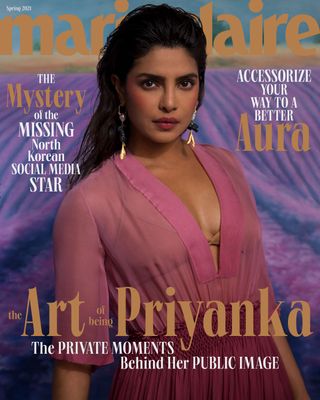
- Kate Winslet discussed the "critical and horrible" media coverage of her weight in the '90s.
- "It was almost laughable how shocking, how critical, how straight-up cruel tabloid journalists were to me," she told the Guardian.
- "They would comment on my size, they’d estimate what I weighed, they’d print the supposed diet I was on. It was critical and horrible and so upsetting to read," she added.
Kate Winslet reflected on the "straight-up cruel" media coverage of her weight after Titanic launched her into superstardom in the '90s, in a recent interview with the Guardian. "In my 20s, people would talk about my weight a lot. And I would be called to comment on my physical self. Well, then I got this label of being ballsy and outspoken. No, I was just defending myself," Winslet said.
Winslet spoke about re-reading tabloid articles about herself, written when she was just 19, and revisiting their brutal criticism of her weight. "It was almost laughable how shocking, how critical, how straight-up cruel tabloid journalists were to me. I was still figuring out who the hell I bloody well was!" she said.
"They would comment on my size, they’d estimate what I weighed, they’d print the supposed diet I was on. It was critical and horrible and so upsetting to read," she continued. "But it also made me feel so…so moved. By how different it is now."
Winslet also commented on the media depiction of the queer relationship at the center of her latest movie, Ammonite, in which she stars alongside Saoirse Ronan. "I have been asked so, so many times about the intimate scenes in Ammonite, way more than I have ever been asked about any heterosexual love scene before. When I have, it’s been comparisons—how was Leo compared with Jude? So embarrassing, so naff. But what happens with the discussion of LGBTQ love scenes is that people actually use different words to describe them."
"'Searingly erotic,'" she continued, "'Titillating,' things that describe the impact that the scene might have on an audience, rather than the content of the scene itself. It really pisses me off, actually."
"What I love about how Francis [Lee, who wrote and directed Ammonite] chose to tell the story of Mary Anning [Winslet's role], and her connection with Charlotte [Murchison, played by Ronan], is that he did it without hesitation," Winslet said. "The relationship is a part of the story. It’s nothing to do with fear, or secrecy. It’s about two people who fall in love."
RELATED STORIES

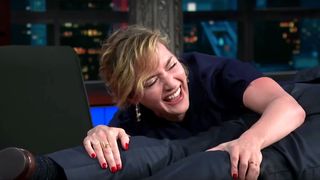
Stay In The Know
Marie Claire email subscribers get intel on fashion and beauty trends, hot-off-the-press celebrity news, and more. Sign up here.

Emily Dixon is a British journalist who’s contributed to CNN, Teen Vogue, Time, Glamour, The Guardian, Wonderland, The Big Roundtable, Bust, and more, on everything from mental health to fashion to political activism to feminist zine collectives. She’s also a committed Beyoncé, Kacey Musgraves, and Tracee Ellis Ross fan, an enthusiastic but terrible ballet dancer, and a proud Geordie lass.
-
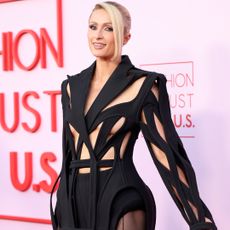 Paris Hilton Is Finally Ready to Share Her Daughter With the World
Paris Hilton Is Finally Ready to Share Her Daughter With the WorldHilton shared why she chose the name London, who her daughter resembles, and the special significance behind her birthdate.
By Fleurine Tideman Published
-
 Kim Kardashian Confirms to Jimmy Kimmel Whether the Weirdest Rumors About Her Are True or Not
Kim Kardashian Confirms to Jimmy Kimmel Whether the Weirdest Rumors About Her Are True or NotEmphasis on the WEIRDEST rumors.
By Fleurine Tideman Published
-
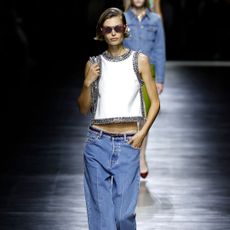 Cute Summer Outfits From the Runways With Real-Life Appeal
Cute Summer Outfits From the Runways With Real-Life AppealFrom beach bumming to al fresco dining.
By Emma Childs Published
-
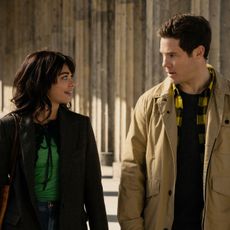 Sarah Hyland and Adam Devine Play 'How Well Do You Know Your Co-Star?'
Sarah Hyland and Adam Devine Play 'How Well Do You Know Your Co-Star?'The 'Modern Family' stars reunited for the 'Pitch Perfect' spinoff series.
By Brooke Knappenberger Published
-
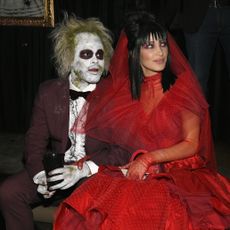 The 78 Best Celebrity Couple Halloween Costumes of All Time
The 78 Best Celebrity Couple Halloween Costumes of All TimeHonestly, we're impressed.
By Charlotte Chilton Published
-
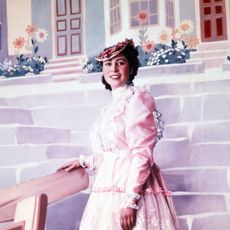 Super Rare Photos of Queen Elizabeth as a Young Woman
Super Rare Photos of Queen Elizabeth as a Young WomanFrom childhood snapshots to portraits as a young princess, beautiful and rare photos of the late Queen Elizabeth as a young woman.
By Mehera Bonner Published
-
 King Charles III and Queen Consort Camilla's Relationship: A Timeline
King Charles III and Queen Consort Camilla's Relationship: A TimelineWith the passing of Queen Elizabeth II, Charles has ascended to the throne as king.
By The Editors Published
-
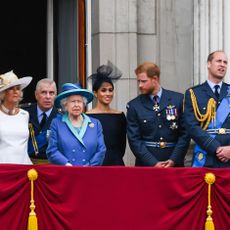 Who Is Next in Line for the British Throne, Explained
Who Is Next in Line for the British Throne, ExplainedAnd yes—Harry and Archie are still in the line of succession.
By Andrea Park Published
-
 Who Is Alexandria Ocasio-Cortez's Fiancé Riley Roberts?
Who Is Alexandria Ocasio-Cortez's Fiancé Riley Roberts?AOC's husband-to-be is an "easygoing redhead" who lives with her in D.C.
By Katherine J. Igoe Published
-
 68 Times the Kardashians Posed Fully Nude and Owned It
68 Times the Kardashians Posed Fully Nude and Owned ItAnd we mean fully nude—as in, not a shred of clothing.
By Bianca Rodriguez Published
-
 Who Is Jonathan Owens, Simone Biles's Fiancé and NFL Player?
Who Is Jonathan Owens, Simone Biles's Fiancé and NFL Player?"The easiest yes!" Simone wrote about the couple's engagement.
By The Editors Published
